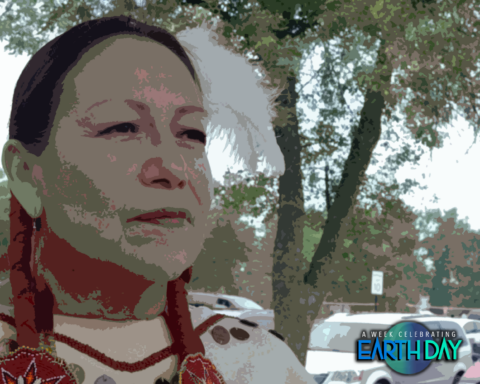Creation is under attack.
Within President Trump’s first 100 days, he signed executive orders that not only assault our environment but also significantly limit our ability to take action and address climate change. From bailing on our international climate commitments, reducing national parks staff, and hindering public engagement on policy proposals – the administration is gutting the environmental progress we have made in the last several years, and key policies that keep all of Creation safe.
One of the most significant executive orders from President Trump declares an “energy emergency,” allowing fossil fuel projects to evade environmental protections including the Clean Water Act, Endangered Species Act, and Marine Mammal Protection Act. To be clear, the United States is not in an energy emergency. In fact, the U.S. is the world’s leading producer of oil and gas, and a top exporter too. Despite this status, the executive order tasks federal agencies with developing more energy production and infrastructure on public lands.
Here is a list of what some of the administration’s harmful actions within the first 100 days do –
- Limit public engagement and judicial review by revising NEPA (National Environmental Policy Act) regulations to gut Environmental Impact Statements. NEPA is a bedrock environmental law that ensures communities impacted by a proposed project are included in the planning and implementation.
- Withdraw from the UN Paris Climate Agreement, for a second time, and end all climate aid to foreign countries. As one of the top emitters of carbon pollution in the world, the United States must pay its fair share to support lower wealth countries who have contributed to climate change the least and are on the front lines of experiencing its impact.
- Reopen protected waters to offshore oil and gas drilling, and expedite permits for fossil fuel development. Offshore drilling poses numerous risks. Oil spills can ruin beaches, contaminate coastal and ocean waters, and harm important ecosystems and habitats that are critical to regional economies.
- Cancel the commitment to 30×30, the goal to protect 30% of our lands and waters by 2030. Marine protected areas are the most effective tool we have for preserving God’s marine creation. They provide areas where ocean life can recover without stress from extractive practices like commercial fishing and oil/gas drilling. Protecting at least 30 percent of America’s ocean with highly and fully protected marine protected areas, while also ensuring strong protections exist in all U.S. ocean regions will help restore the health of our ocean life.
- Halt, indefinitely, all offshore wind energy permitting, leasing, and approvals, and assess options for terminating existing offshore wind leases.
- Eliminate or redirect all unspent Inflation Reduction Act and Infrastructure Investment and Jobs Act funding for renewable energy or climate related projects, including terminating or re-evaluating all policies that support the adoption of electric vehicles, including the EV tax credit. This Executive Order does not impact “direct pay,” a clean energy tax credit that non-profits, including houses of worship, can apply for when seeking to install solar panels on their buildings.
- Eliminate all environmental justice related offices and positions across the government. These offices were key in addressing institutional racism and creating solutions that addressed cumulative impacts on communities of color. As Christians committed to ant-racism, we know these actions promote racism and uphold white supremacy.
- Significant cuts across federal agencies, including the National Oceanic and Atmospheric Agency (NOAA). NOAA provides a wide range of important services, including weather forecasting that keeps our neighbors and communities safe in the event of extreme weather. NOAA staff have raised an alarm around these cuts, recognizing that they may not be able to promptly provide forecasting data, including lifesaving warnings for tornadoes and hurricanes.
Unfortunately, this list is not comprehensive and there is far more damage being done. As Dr. Ayana Elizabeth Johnson writes, “By the end of Donald Trump’s second presidential term, sea levels will be higher, weather will be more extreme, and the urgency for implementing climate solutions will be even greater.”
How do we respond?
Witnessing these harmful attacks on creation is gut-wrenching and can produce a lot of anxiety. I know communities of faith are heart sick over these devastating changes that will harm people and precious ecosystems we care deeply about. Friends, we must not give into despair.
Right now, I’m thinking about adrienne marie brown’s work in emergent strategy, which asks the question: “How do we cultivate the miracle of radical imagination needed to dream together beyond fear?” Christian communities have an incredible role to play in this work of radical imagination – many of you are already leading the charge.
Now, more than ever, telling stories is vital to push back on these harmful policies. Has your congregation benefitted from “direct pay,” or have you saved on your utility bill from installing solar? Do you have a pollinator garden or recycling program? How can you tell the story of how your congregation is living out your values of caring for creation to your elected officials?
There is value in contacting your Member of Congress – regardless of their position, their constituents’ concerns matter to them. The number of Representatives in support of clean energy tax credits is growing, so sharing your message can make an impact.
When your Members of Congress are in the state, consider joining a town hall to hold them accountable for programs that impact creation care. Town halls are a great place to ask questions and share your stories.
Build a relationship with staff in your Congressional delegation’s in-district office! Traveling to Washington DC can be a great way to carry your message, but is not the only way. In-district staff are a valuable resource and tool to ensure Members understand their constituents’ concerns.
Write a personalized letter, or hold a letter writing campaign after service! Handwritten letters are still an effective way to share your concerns. In fact, most offices find letters to be more impactful than an email campaign. There is value in sharing your personal experiences.
Lastly, consider becoming a Creation Justice Advocate. At Creation Justice Ministries, we believe that faith calls us to action—especially in a time when urgent advocacy is needed to protect and restore God’s creation. We know many of you are eager to do more, and we want to provide meaningful ways for you to engage at the level that works best for you. By signing up for our advocacy network, you’ll receive timely updates on policy priorities, opportunities to take action, and resources to support faith-based advocacy in your community. Whether you’re looking to stay informed, lead your congregation in advocacy, or take action at the district level, we have a place for you.
There is power in community. May our actions be driven by our collective imagination to build a world beyond fear – where ALL of Creation can thrive.

Madison Mayhew is the Policy and Advocacy Manager of Creation Justice Ministries. She brings extensive experience in faith-based environmental federal advocacy work and a deep commitment to climate justice. Madison joins CJM from the National office of Interfaith Power & Light, where she most recently served as Federal Policy Manager supporting a network of over 40 IPL affiliates in advancing environmental policy. She previously worked with the UCC’s Washington DC Advocacy Office, IPL’s DC, Maryland, and Virginia affiliate, and served as the co-chair of the Energy and Ecology Working Group of the Washington Interfaith Staff Community. Madison has a Masters Degree in Social Work from Washington University in St. Louis and a Bachelors of Social Work from Lipscomb University. She is based in Baltimore, Maryland, where she enjoys watching birds with her spouse, and exploring her creativity through sewing, crafting and photography.
Additional resources if needed:






Unbound Social